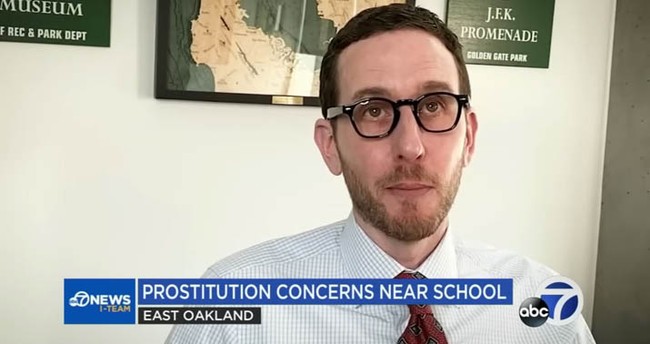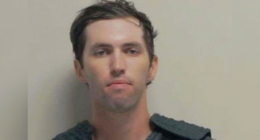
More than 2 1/2 years ago, I wrote about the prostitution problem in San Francisco. Neighbors of one particular street, Capp St., were complaining about a sudden uptick of business on their block that was making it difficult to sleep at night.
“There’s rampant prostitution on Capp street,” said one resident who did not want to reveal her name out of fear. “I wake up multiple times a week at night. My kids have missed school. I miss work. It’s the John’s in their cars, racing back and forth, turning their music on, having sideshows with their cars.”…
Neighbors told KTVU they realize many of the sex workers are being trafficked and are victims. But they want enforcement and accountability so they can simply walk outside their homes at night and raise their kids in a safe community.
The issue wasn’t limited to Capp St. The same problems were happening near a Catholic grade school in Oakland.
Parents and city officials tell the I-Team young women, some police believe may be trafficked, are walking outside St. Anthony’s K-8 grade school off E. 15th Street in Oakland at all hours of the day…
[Rosa] Vargas called the Oakland Police Department as she picked up her daughter from school requesting officers come by to check the area. Just outside her window, a young girl in black stilettos was seen walking across the street from the school.
Why weren’t police doing more about this problem given that so many adults and parents were complaining? According to the Oakland PD, part of the problem was a new law promoted by State Senator Scott Wiener.
Previously, loitering with the intent to engage in prostitution was illegal. But SB 357, a bill introduced by State Sen. Scott Wiener repealed that law, in part because he found it to be disproportionately targeting transgender women.
“It allowed police officers to arrest a person, not based on what they did, but based solely on how a person looks,” said Sen. Wiener. “So an officer could arrest someone because they were wearing tight clothing, high heels, and extra lipstick.”
Anti-trafficking groups around the state agreed the new law had made it much difficult for police to arrest traffickers and to pull trafficked children off the streets.
Prostitution remains illegal in California. But police have lost significant ground in the effort to contain it, women at anti-trafficking nonprofits in the Bay Area, San Diego, and Los Angeles all emphasized. “The only time they have the right to engage and investigate is if they hear the transaction going on between the buyer and the exploited person,” said Russell, who works closely with the Oakland Police Department. “Which means it would have to be a sting operation where there’s an undercover officer posing as an exploitive person who can actually hear the transaction. Any other scenarios would not be grounds for the police to get involved.”
Sergeant Marcos Campos of the Oakland Police Department told me that his force rescued 24 underage girls from the streets in 2021. But in 2022, that number dropped to 14—most from before the law was signed. “Since, I believe, July, when we were officially told it passed, we have been directed by the district attorney’s office to not arrest for [statute] 653.22, which is loitering,” he said.
Why is this happening? Because Sen. Wiener pushed this bill at a moment in time when no one dared say no to anything involving trans people.
Why would anyone propose such a law? Why would the California State Legislature pass it? I asked the bill’s author, San Francisco–based state senator Scott Wiener. The answer he gave is the one that he supplies for so many of the bills he authors: it was necessary to advance the rights of LGBTQ people. “If you are standing on the sidewalk with high heels, and you wear your hair a certain way, and you wear tight clothing, an officer can say, ‘I think you’re loitering with the intent to commit prostitution’ and arrest you,” Wiener said. “That is not how we should be doing things in the United States of America—arresting people for how they look,” he continued. “And when you do that, not surprisingly, it’s only certain kinds of people who actually get arrested: it’s trans women. It’s black women. . . . It’s an inherently profiling law,” he said. “Randomly arresting a bunch of black trans women for how they look is not protecting potential victims of human trafficking.”
But were the police indeed “randomly arresting a bunch of black trans women”? The anti-trafficking advocates I spoke with dispute this. For starters, Wilson, Powell, and Russell (all of whom are African-American) say that biological women and girls—not transgender individuals—constitute the vast majority of those trafficked. Nearly every report on human trafficking by global human rights organizations confirms this observation.
All of this information has been out there for years at this point, but local news reports and stories in the City Journal don’t move the needle for people on the left. So it’s quite a change to see some of this appearing in a story for the New York Times Magazine. This story is specifically about girls being trafficked in Los Angeles, but once again, Wiener’s Law is cited as a factor in why police can’t do more to stop this. [emphasis added]
The Blade was an eight-minute drive from the University of Southern California, and yet another universe. Parents pushed strollers past the trafficked girls as they took their own children to school. Amid boarded-up storefronts were a few that catered specifically to the trade: a smoke shop with the banner “free Magnum condom with any purchase” and a lingerie store named — in cursive — Sluts. Figueroa seemed to be the one street in all of Los Angeles where nobody ever honked: Customers waited politely, as if in line at a drive-through, to peruse the menu and take their pick…
For the 77th Street Division, which covers the northern half of the Figueroa Corridor, prostitution had always been a problem. But in recent years, the officers had seen the magnitude of child sex trafficking explode. Part of that boom happened during the pandemic, when many girls were out of school and immersed in social media, where traffickers lurked. Teachers who would ordinarily follow up on absences or report signs of neglect could not…
As trafficking grew, the means to deal with it shrank. In 2021, the Police Department’s central human-trafficking unit was disbanded following budget cuts, leaving each division fewer resources to tackle the problem. According to Navarro, the 77th Street Division was supposed to have six investigators at Armendariz’s rank in its vice unit. Instead, she was the only one.
Their jobs grew even more challenging when California repealed the law allowing the police to arrest women who loitered with the intent to engage in prostitution. The repeal, known as SB 357, was intended to prevent profiling of Black, brown and trans women based on how they dressed. But when it was implemented in January 2023, the effect was that uniformed officers could no longer apprehend groups of girls in lingerie on Figueroa, hoping to recover minors among them. Now officers needed to be willing to swear they had reason to suspect each girl was underage — but with fake eyelashes and wigs, it was nearly impossible to tell. One girl told vice officers that her trafficker had explained things succinctly: “We run Figueroa now,” he said.
Soon every intersection from Gage to Imperial had girls waving and waiting to be rented out, some of them imported by traffickers from Oregon or Texas or Alabama. By the end of 2023, the city attorney had taken to calling Figueroa the Kiddie Stroll because so many of the girls weren’t even 13.
The Kiddie Stroll. That’s what Sen. Scott Wiener has created, a city where 12-year-olds dressed as prostitutes can’t be arrested, supposedly to protect trans people. Of course, this bill could have been vetoed by Gov. Gavin Newsom but it wasn’t. Newsom signed it so he’s responsible for this too.
I’m not hopeful that California will undo this stupid law but this really ought to be a major issue in Newsom’s campaign for President and in Wiener’s campaign to take the seat held by Nancy Pelosi. Bring it up every day of the campaign and make them defend it. Bring trafficking victims to the debate. Talk about the impact of this law on children until everyone knows about it.








